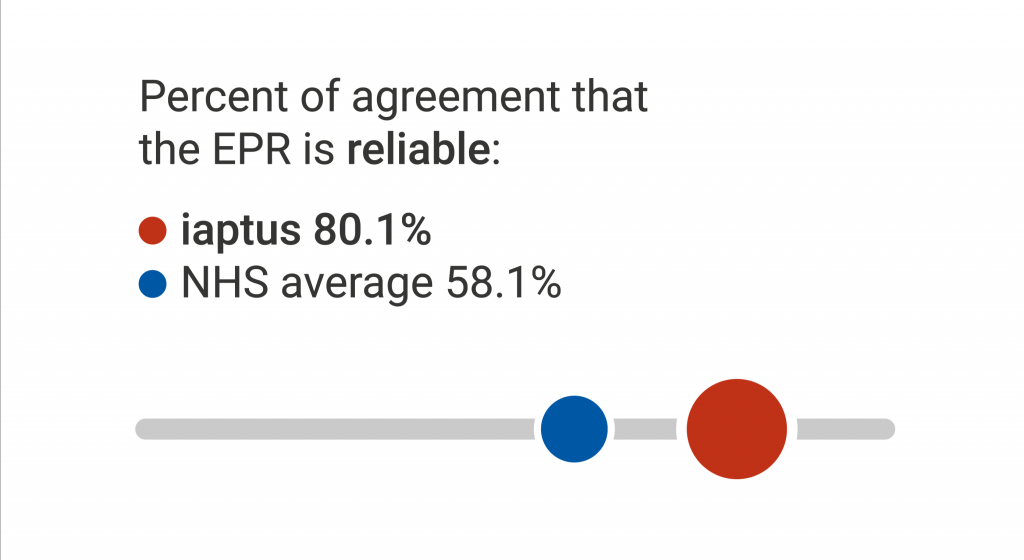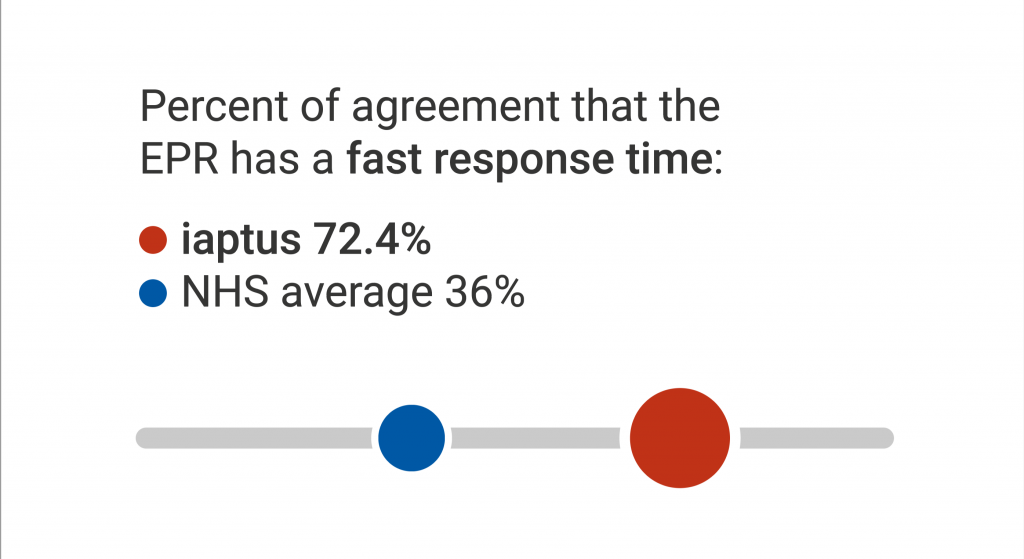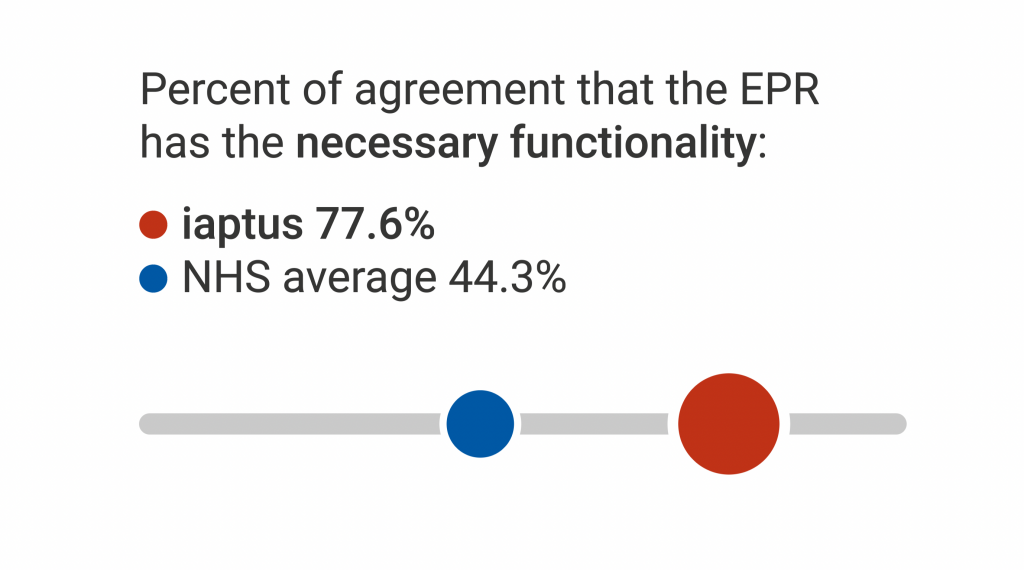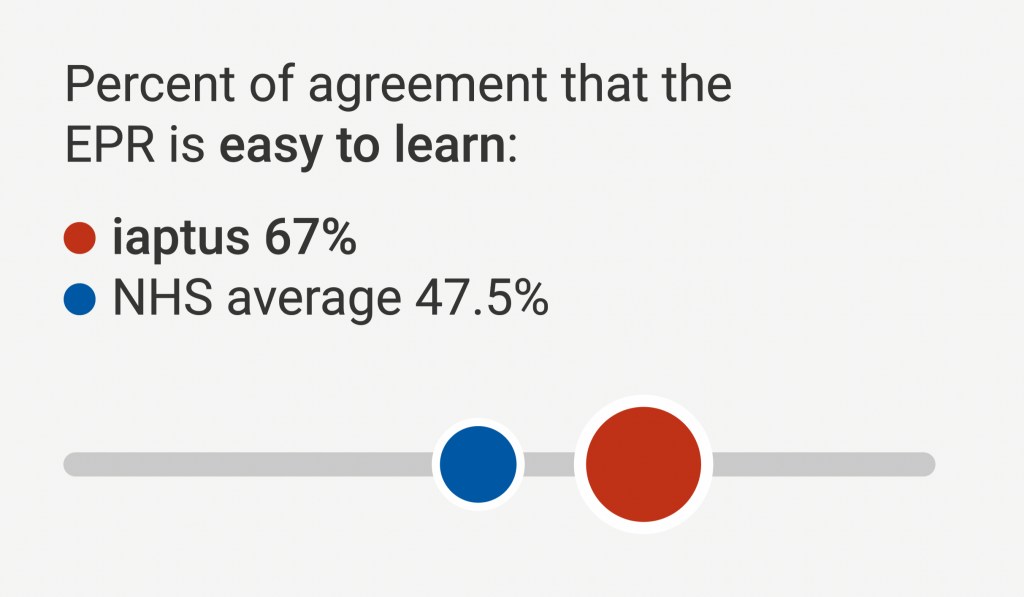
What is the NHS EPR Usability Survey?
The NHS EPR Usability Survey was first circulated in 2021, and was designed to collect the experiences of NHS staff across England. There has since been multiple versions focusing on different areas of healthcare. Our iaptus electronic patient record (EPR) was included in the first wave of the survey which was looking for feedback from NHS staff in mental health, community and ambulance settings.
How did we do?
Not so fast! Before we share our results with you, let us introduce ourselves and what it is we do to support NHS mental health services.
Who is Mayden?
Mayden is a health tech company that creates insightful software, supporting healthcare services to deliver patient centred, outcome focused and data driven care. Over the last decade we have focussed on creating a flexible and customisable EPR, developing tools that help services run with efficiency and improve the patient experience.
What is iaptus?
I’m glad you asked! iaptus is our flexible and customisable EPR system that manages the care of patients across 100 NHS organisations, securely holding the records of over 6.5 million people.
iaptus supports physical and mental health services delivered by public, private and the voluntary sector, both here in the UK and internationally. In the UK, iaptus is the leading clinical software for psychological therapies, supporting over 65% of referrals to NHS talking therapy (IAPT) services.
NHS EPR Usability Survey Results: How we did, and what’s next
So how did we do? Well firstly, the full results from the survey includes comparisons with global clinical systems, but for now we are just going to focus on the NHS.
Reliability and speed

We were pleased with our results for both reliability and speed but since the survey was conducted, we have continued to invest further in our infrastructure. iaptus has always been cloud hosted so we have always looked to take best advantage of modern technologies. We’ve recently moved iaptus to Amazon Web Services (AWS) and have noticed significant improvements in speed and performance as a result. We have also invested in new monitoring tools to help our technical teams optimise our system to continue improving performance.

Functionality
We are always looking to improve the features and functionality of iaptus. We recently introduced online appointment booking and video consultation features within iaptus which are bringing significant benefits to services. For us to focus our energy in the right place, we will need more detail from customers about what new features would be helpful and which areas of the existing system could be improved. This will be an agenda item at our next user group.

Integration
We believe that safe, effective, high quality care is dependent on interoperability.
For that reason we prioritise projects that enable data flow between ourselves and other systems. We currently integrate with over 30 other clinical systems including Rio, SilverCloud, Wysa and Healthcare Gateway. Our team also continues to work with groups seeking to improve interoperability on a national level. Based on this feedback, and to improve in this area, we have already set ambitious targets to serve iaptus data into Local Care Records across England. We will also need to gather more feedback from customers about the system integrations that they’d like us to prioritise. This will be a workshop session at our next user group.
Clinical alerts
This is the area that, based on this survey feedback, we are most keen to improve. Following feedback from user meetings, we have already improved flagging for digital referrals. Incorporating coloured alert flags into iaptus to indicate risk and clinical safety information provided by external referral applications. We will continue to work with our customers to find additional ways to support care with alerts.
Easy to learn

This was feedback that made our team really proud. We have invested heavily in user experience, with dedicated UX specialists embedded in our development team. We have designed iaptus and developed tools and processes which means training typically takes just one day. That said, we are still keen to improve and will continue to adopt UX best practice whenever possible. We are also currently scoping improvements to our customer help site to support both initial training and ongoing system use for customers.
Why are we sharing this?
We believe that great things happen when we collaborate with others, and are open about our strengths and where we need to improve. Our customers took the time to give us valuable feedback, and sharing that keeps us all accountable and working together to achieve a common goal –
improving patient care.
- These are our overall results. If you are a Mayden customer and you’d like to discuss the results of the NHS EPR Usability Survey for your trust in particular, please get in touch with your account manager who will be glad to set up a meeting.
- Mayden will be exhibiting at the HETT conference on the 27th-28th of September. Drop by our stand for a chat and to pick up a copy of our EPR Usability Survey results.
- At our last roundtable discussion, we discussed the future of the EPR. If you have any questions or if you would like to put forward any ideas towards our next roundtable for CIOs & CCIOs, please get in touch.

